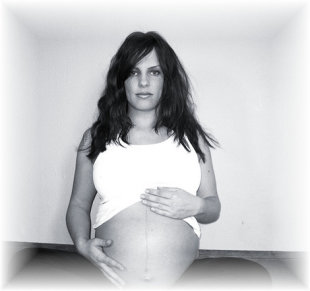
I had my first child at 33-years-old. Practically an old lady, according to all of you.
As Slate notes, according to a new Gallup poll, most Americans think that women should start having children by age 25.
That's the ideal.
Do you know what I was doing at 25?
Dancing on bars after 4 too many shots of Jagermeister. Dating as many men as possible to figure out that guys who kick in your car door probably aren't the marrying kind. Working my way to the top of the journalism food chain, first at FOX in Salt Lake City and later ABC in New York City, both of which involved 10-hour workdays. I was traveling. New York City, Mexico, London, Italy … you get the idea. I was grabbing myself a big ol' handful of life whilst trying very hard not to create it, because that wouldn't have been ideal. For me.
What I'm telling you in a rather roundabout fashion is that 58% of the more than 5,000 people surveyed -- the ones who say women should have children in their late teens or early 20s -- are just plain wrong. But that's not all. Anyone who says women should have children by any age is wrong.
These kinds of surveys are so annoying, yet they seem to immediately go viral and do such a disservice to women out their living their lives and making choices based on what's right for them - decisions that likely already go against the grain of what society/our parents/religion/TV/movies tell us. Decisions like our careers, delaying motherhood, choosing to be a single mom … but that's exactly what's wrong with any survey related to the ideal kind of parenting: there are no absolutes. You should do what is best for your circumstances; breastfeed/don't breastfeed, let your kid cry it out/pick him up every time he sniffles, feed him gluten/don't fee him gluten … WHATEVER.
Ideal for me was waiting until I was in my 30s. For you, it might mean getting married out of high school and starting a family. For someone else it might mean never having kids. The ideal age to have a child is the age you finally decide you're emotionally and financially ready to have a child. Or the age at which you accidentally get knocked up and decide you want to have the baby come hell or high water. Doesn't feel ideal at the time? Make it ideal. Don't let anyone with their lists and statistics and personal anecdotes tell you it can't be done. Pregnant and excited about it? It's ideal, girlfriend. But if you're the kind of person who gets all hot and bothered by statistics and the opinions of others, here are the cold, hard facts and numbers connected to the survey as reported by Slate:
Americans who are college-educated are much more likely to think women should wait until they are 26 or older to have children. Only 3 percent of moms with a college degree give birth before age 25, and a full 31 percent of all mothers with a bachelor's degree are over 35 when they have their first kid. Furthermore, there's a lot of evidence that the gains in wages over the past few decades have been made by childless women and that the longer women wait to have kids - up to a point - the better it will be for their lifetime earnings and financial security. The fact that less educated young people still think that women should have children young isn't good news for our already yawning class divide. The younger you have kids, the more difficult it is to pursue higher education, and according to a Pew study, "What is irrefutable … is that on average the more education a woman has, the better off her children will be."
That's all well and good, but I've got another stat for you: the CDC says nearly 40% of U.S. births are the result of unplanned pregnancies. Almost half of the time, it just happens when it happens. That's how life works. It's what happens when you're busy making other plans and worrying about ideals and what everyone else thinks. Everyone goes through life at their own pace, and, as a result, has their own unique set of traits to offer a child at each and every age. What you can give your child at 23 I likely couldn't have offered mine until 35. What I can provide at 37 is maybe something someone at 21 is lacking. Not better or worse. Just different. LINK


